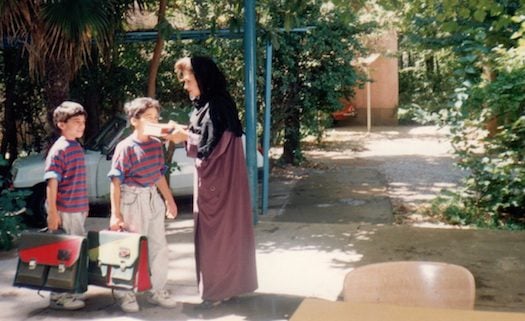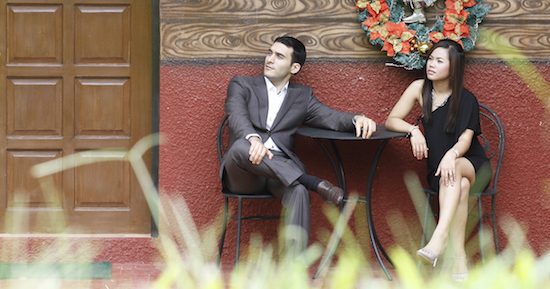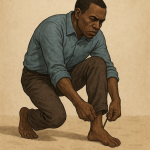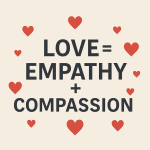By Kristen Hovet –
When he was just 12 years old, Armin Navabi threw himself off the top floor of his middle school. His suicide attempt was not successful. He fractured his back, broke both legs and one hand, and ended up in a wheelchair for seven months. He missed an entire year of school.
To young Navabi, killing himself was the best way to avoid the chance of burning in hell for eternity. Muslim boys are taught that “you’re pure until you’re 15, because there’s no way you could be responsible for anything you do [before then],” he says. “So that means that if you die before age 15, you die pure and you go to heaven. For me, this was a loophole in the system… Why would anybody stick around and gamble potentially burning for eternity? The most logical decision is to quit this game that I never chose to play, early, and just go directly to heaven.”

His suicide attempt devastated his parents, who, like the majority of upper class Iranians, were non-practicing Muslims. “It wasn’t good,” he tells me. “I saw my dad cry for the very first time. That was a huge shock to me. I saw my mom collapse in the hospital from depression. It was hard. The only reason I didn’t try [killing myself] again was because I didn’t want them to experience that.” With his parents heartbroken, Navabi set out to be an even more devout Muslim. He hardly missed a prayer, fasted during Ramadan, did his Quranic readings, and avoided thinking about girls.
A few years went by and Navabi’s faith began to flounder, regardless of the strong influence of religious teachers at his school. He felt ashamed for doubting Islam, but trusted that his god was a god of reason and would surely deliver. “But it didn’t go that way,” he says. “I went to hunt for evidence, and I didn’t find anything.” He read voraciously, concentrating on his own religion, other religions, and history, and came to the conclusion that all religions are manmade. But he did not arrive at this conclusion painlessly.
“It got to the point where I was begging God for evidence. I cried. I was like, ‘God, I’m going to lose faith in you. So, if you’re out there, show me something! Anything!’” By the age of 18, Navabi had given up. He knew he was an atheist and that there would be no going back.
Now, at the age of 31, a lot has changed from his experiences in Iran to his current life in Canada. He is the founder of the Atheist Republic website and the Atheist Republic Facebook page, which alone has over one million likes – making it one of the most popular pages of its kind. Atheist Republic first began as Iranian Atheists in 2011 on a social networking site called Orkut, before being transferred to Facebook.
Navabi created the page out of sheer loneliness; as he describes, “I had this constant image that I’m in a room with everyone else sleeping around me and I’m the only person awake, and I’m feeling alone. I feel so alone!” He wanted to use the page to reach out to other Iranian atheists, expecting that the numbers wouldn’t be very high. Within just a few weeks, however, hundreds of people had joined, far surpassing his expectations.
“We felt so relieved that we are not crazy!” Navabi says, laughing. “It felt like a family.” Soon people from all around the world began joining. They shared their experiences, found comfort in meeting others like themselves, and participated in online debates. Navabi had found his calling.
Atheist Republic is now Navabi’s full-time job. “I’m not just an atheist. I’m an atheist activist. … That’s all I do. I write books about atheism. I write blogs about atheism. I lead a community of atheist activists around the world. So, it’s most of my day and hers,” he says, smiling at his wife, Charlyn, who is sitting across from him in the living room of their top floor apartment in downtown Vancouver.
Charlyn, originally from the Philippines, is Atheist Republic’s social media manager. Still a practicing Catholic when she and Navabi married in early 2013, Charlyn experienced her own journey from Catholicism to atheism shortly after their wedding. The couple make it clear that Navabi did not encourage Charlyn to become an atheist. “She asked all the questions,” Navabi says. “She was very curious, and I was prepared to accept all of her [Catholic] views.” However, when he suggested that they go to church together on Sundays, wishing to respect her faith, she said that she was no longer interested.
Navabi’s accepting approach is very different from the Richard Dawkins and Christopher Hitchens types that currently represent atheism in many people’s minds. Navabi has no problem with their more militant or hardline stance, as he believes that this works for sparking interest in atheism for some people, but finds that his own approach is much gentler.
When asked if he has any religious friends, he says, “I’m actually more interested in talking with religious people than atheists … because with religious people there are things we can learn from each other. We could disagree, passionately, about different topics and still not hate each other.”
This unifying vision shows up time and again, such as when he discusses the current purpose of Atheist Republic: “We shouldn’t live in a world where you can’t express what you believe in, where you are afraid to say your views – no matter what those views are, even if it’s not atheism. I will support other people that are fighting for this same cause. I will support people that are being oppressed because of their Christian views. I will support people that are being oppressed because of their Islamic views.”
In return, he would like others to acknowledge the oppression experienced by atheists all over the world. “In Vancouver, atheists are like, ‘You know, I’m an atheist, but that’s a secret!’ In Vancouver! One of the most secular cities in the world! So, imagine if atheists feel like that here, what do atheists feel like in Iran, or in Egypt, or in Saudi Arabia, or in Pakistan, or in the Philippines!”
Atheist activism, he believes, will help inform the world that atheism is not bad, nor is it something to be ashamed of. If you live in a place where it is safe to out yourself as an atheist, Navabi thinks that you should. The simple decision of declaring oneself an atheist is the first step to activism.
Navabi’s book, Why There Is No God: Simple Responses to 20 Common Arguments for the Existence of God, which he wrote for atheists and believers alike, celebrated its one year anniversary last month.
 Kristen Hovet received her English degree from Simon Fraser University. She is working on her first novel (Blanco) and co-writing a feature film (Beyond Good and Evil). On Antarctica Naked, Kristen’s collection of ultra-short fiction, is available in e-reader format on Amazon. She is a staff writer for Immortal News, regular contributor at Globalo, and founder of The Swanky Skeptic. Kristen was a headshot photographer for over two years and still picks up the camera from time to time. Born in North Dakota, she has moved over 30 times in her life and currently resides in Vancouver, BC.
Kristen Hovet received her English degree from Simon Fraser University. She is working on her first novel (Blanco) and co-writing a feature film (Beyond Good and Evil). On Antarctica Naked, Kristen’s collection of ultra-short fiction, is available in e-reader format on Amazon. She is a staff writer for Immortal News, regular contributor at Globalo, and founder of The Swanky Skeptic. Kristen was a headshot photographer for over two years and still picks up the camera from time to time. Born in North Dakota, she has moved over 30 times in her life and currently resides in Vancouver, BC.















